EESA06 Topic 3: Divergent Margins
1/93
Earn XP
Description and Tags
Lecture 4 - Embryonic and Juvenile Oceans; Lecture 5 - Mature Ocean Basins
Name | Mastery | Learn | Test | Matching | Spaced | Call with Kai |
|---|
No analytics yet
Send a link to your students to track their progress
94 Terms
What is the Wilson cycle?
Describes how oceans open and close
i.e., ocean basin lifecycle
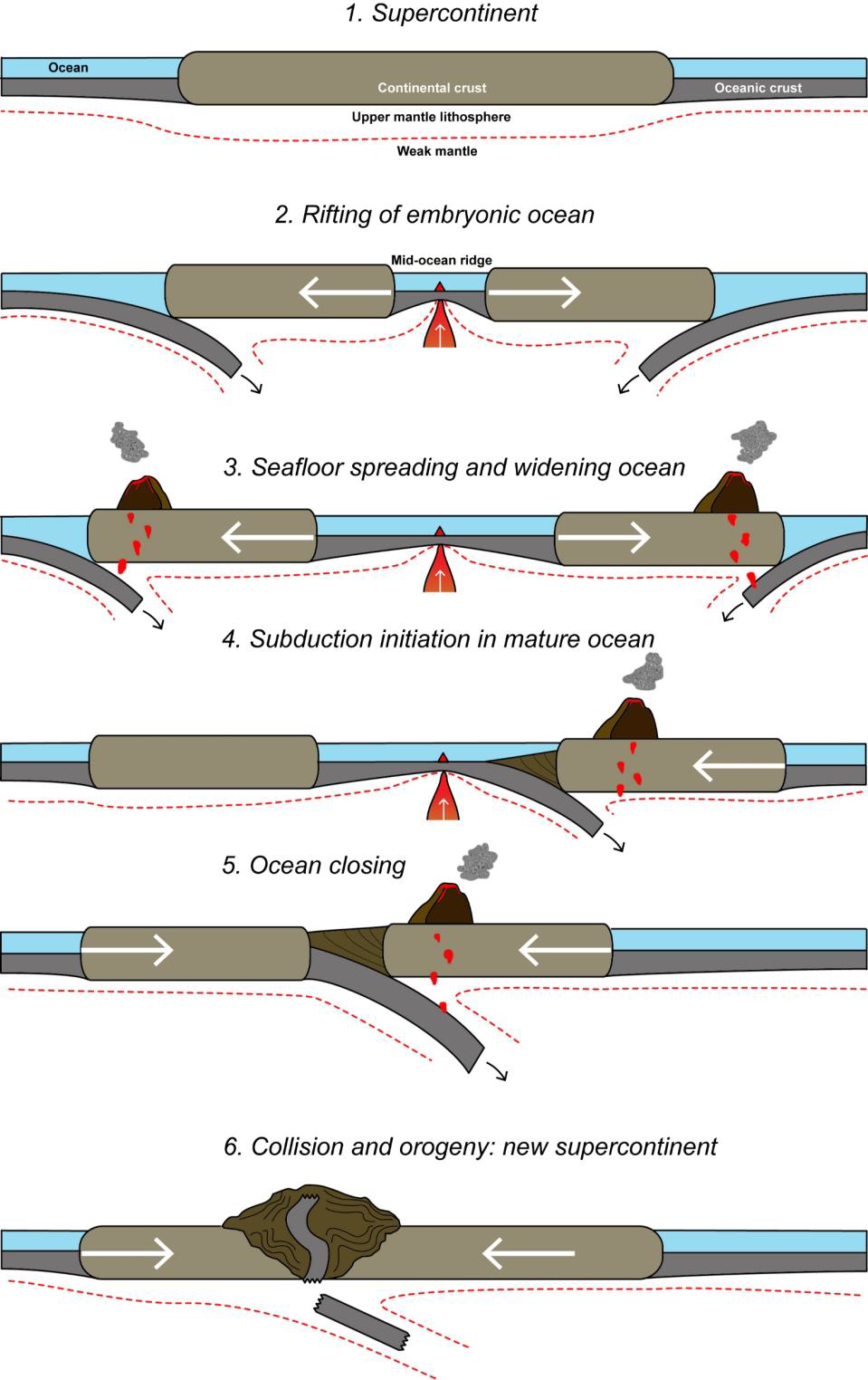
What is the most important group of minerals? Why?
Silicate minerals
i.e., those containing silica and oxygen
Accounts for 90% of all minerals
How does silica content differ across the lithosphere?
Continental crust - felsic
high levels of silica + feldspar
Oceanic crust - mafic
less than 50% silica; mostly magnesium and iron
Mantle - ultramafic
less than 40% silica; mostly magnesium and iron
How is silica related to magma's properties?
It controls most of magma's properties
e.g., velocity
Describe how magma is generated.
From melting of rock
i.e., when rocks
Undergo decompression
Are heated
Get wet
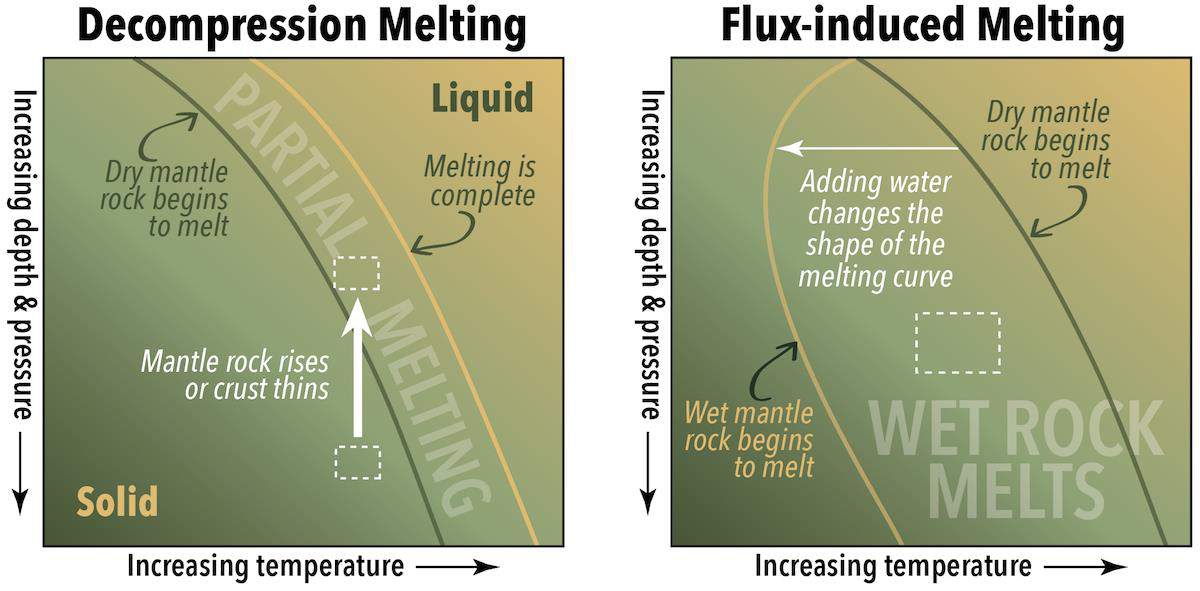
Describe decompression melting.
Rock rises from an area of high pressure to lower pressure
Change in pressure causes rock to (partially) melt
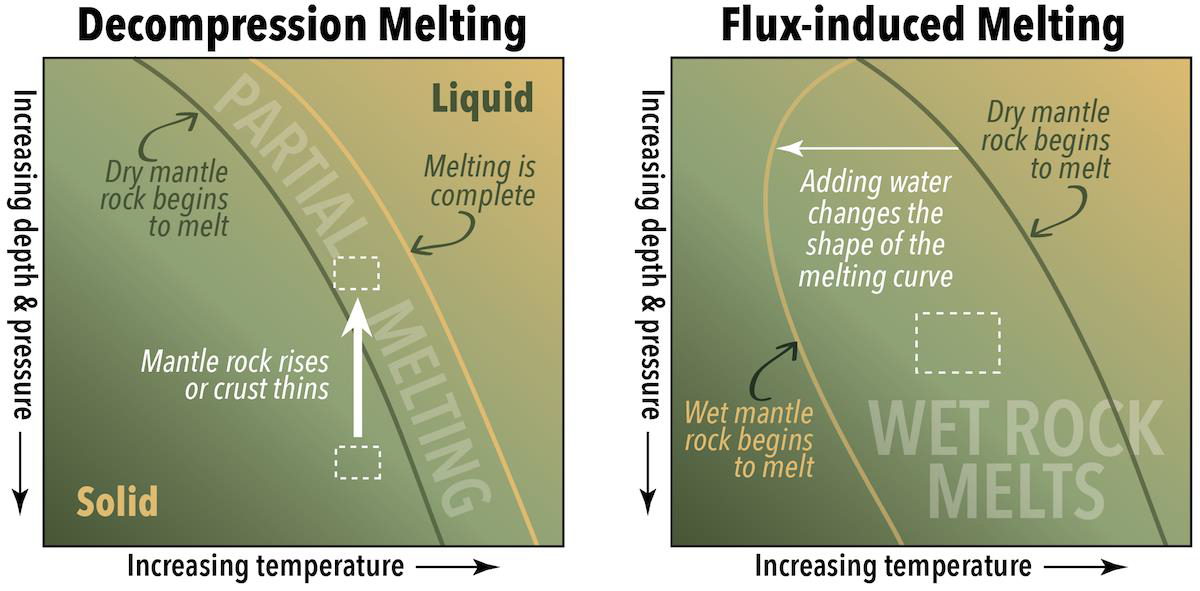
Describe Flux-Induced melting
Adding water to rock changes how it behaves (i.e., melts) at different pressures or temperatures
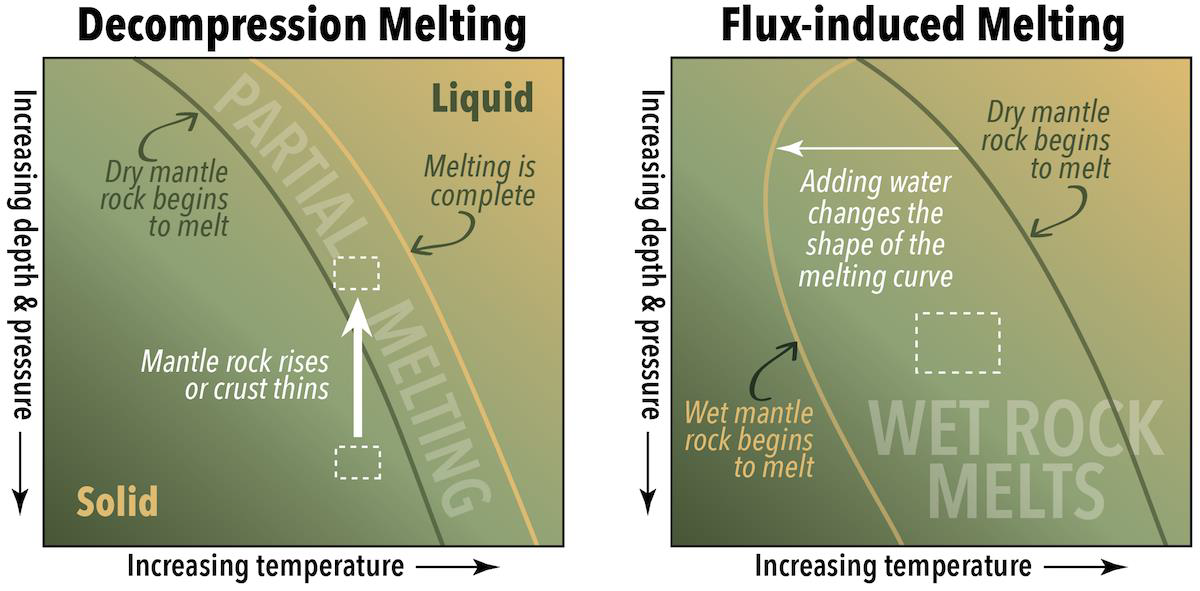
Where does decompression happen? Explain.
At mantle plumes
This is where mantle rock is brought up
i.e., moves from higher to lower pressure
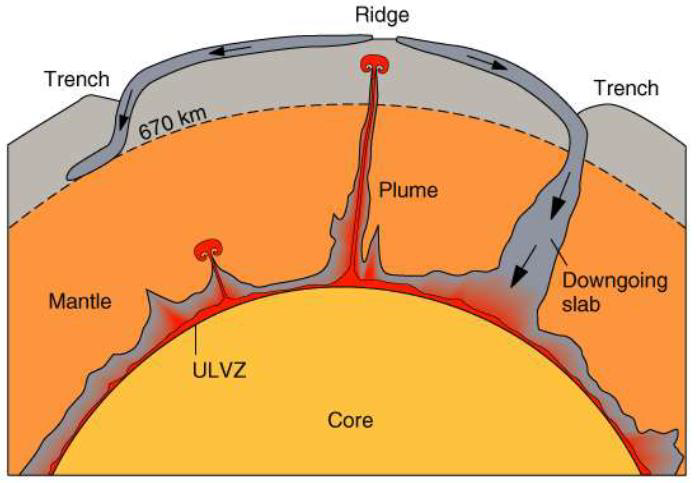
Is melting usually partial melting or full melting? How does this influence the resulting magma?
Partial; silica-rich melts before silica-poor
Magma is more silica-rich than melting rock
Differentiate between wet magma and dry magma
Hint: location, silica, viscosity, colour, density, other
| Wet | Dry |
Location | Convergent margins | Divergent margins |
Silica content | Higher | Lower |
Viscosity | Higher | Lower |
Colour | Lighter | Darker |
Density | Lower | Higher |
Other Notes | Water causes melting where we would usually see solid rock | Produced from melting of the top of the mantle |
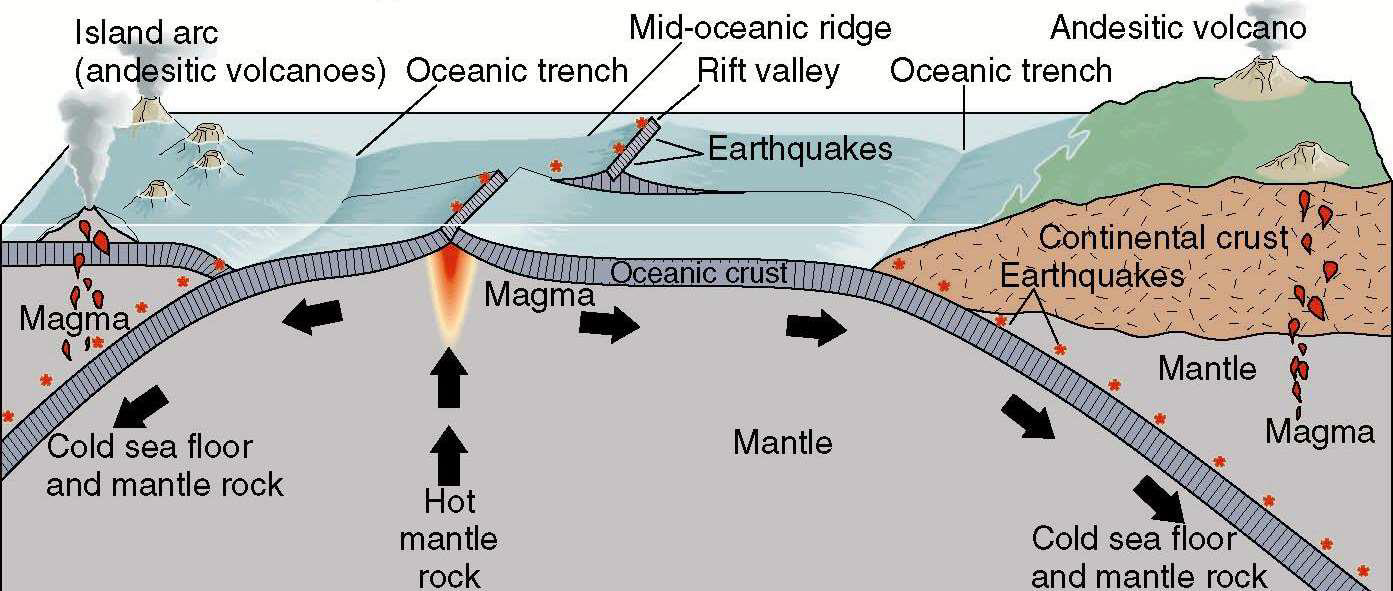
How do high silica magmas compare to low silica magmas?
They're more viscous
They crystalize minerals with more silica tetrahedra in their structure
Why is ocean floor mostly basalt (i.e., more silica-rich than mantle)?
Ultramafic mantle → melts a little through decompression → mafic ocean floor
What minerals are abundant in convergent margins?
Silica
i.e., felsic
What volcano types are associated with convergent margins? Describe these volcanoes.
Stratovolcanoes
High viscosity magma
Magma doesn't get far → pointy volcano
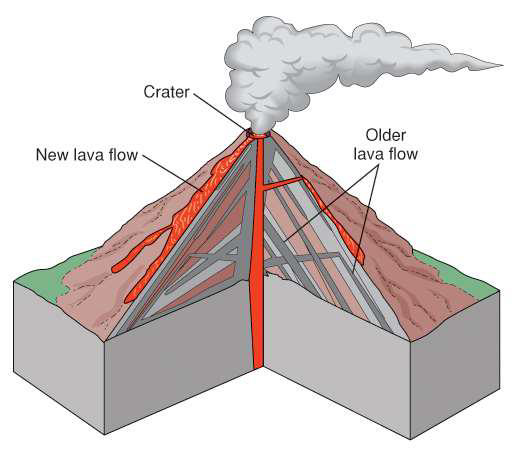
What minerals are abundant in divergent margins?
Iron
i.e., mafic
What volcano types are associated with divergent margins? Describe these volcanoes.
Shield volcanoes
Mafic magma
Lower volcanos, wide-reaching flows (lower viscosity magma)
e.g., erte ale volcano
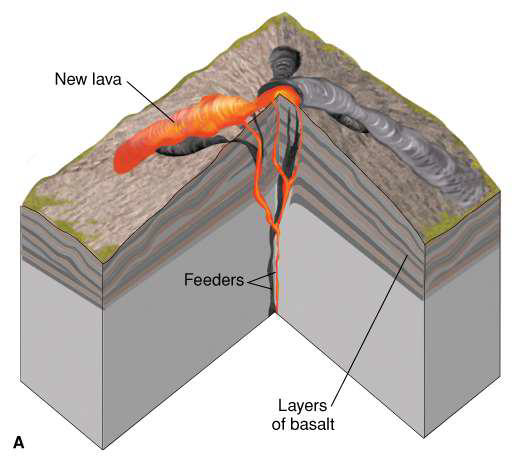
How does cooling time and time spend underground influence magma?
Give examples of each instance.
does silica amount differ across instances?
Rapid cooling → low crystal count
e.g., obsidian
Medium cooling → slightly more crystals
e.g., rhyolite
Slow cooling + completely underground → high crystal count
e.g., granite
In each instance, silica amount is similar
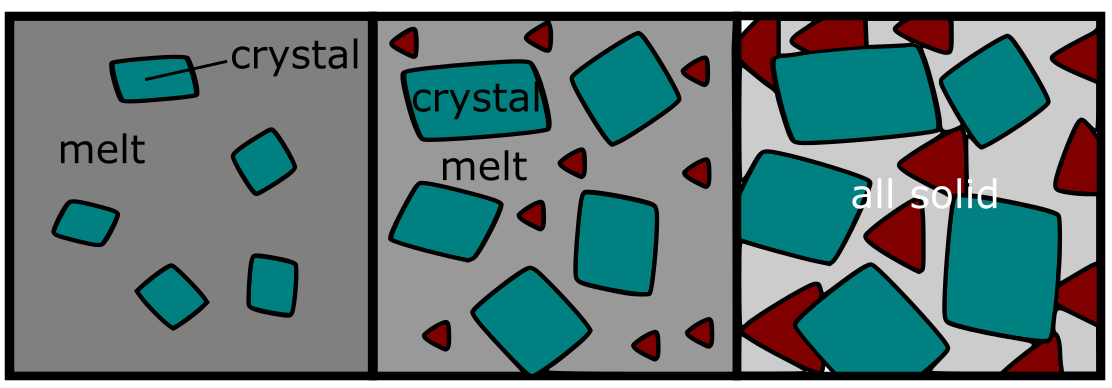
What are igneous rocks? List the two types.
The product of cooled magma
Volcanic rocks: erupt at surface
Plutonic rocks: cool underground
Where does igneous rock cool? Give examples.
Earth's surface (extrusive/volcanic)
e.g., lava flow
Underground (intrusive/plutonic)
e.g., dikes
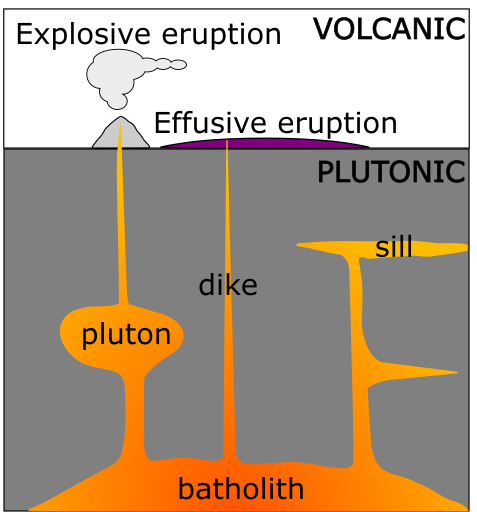
What are examples of heterogenous rocks?
Granites
Other igneous ricks
Sedimentary and metamorphic rocks
why do shield and stratovolcanoes produce different magma?
difference in silica content
What is continental rifting?
Pulling apart/extension of land
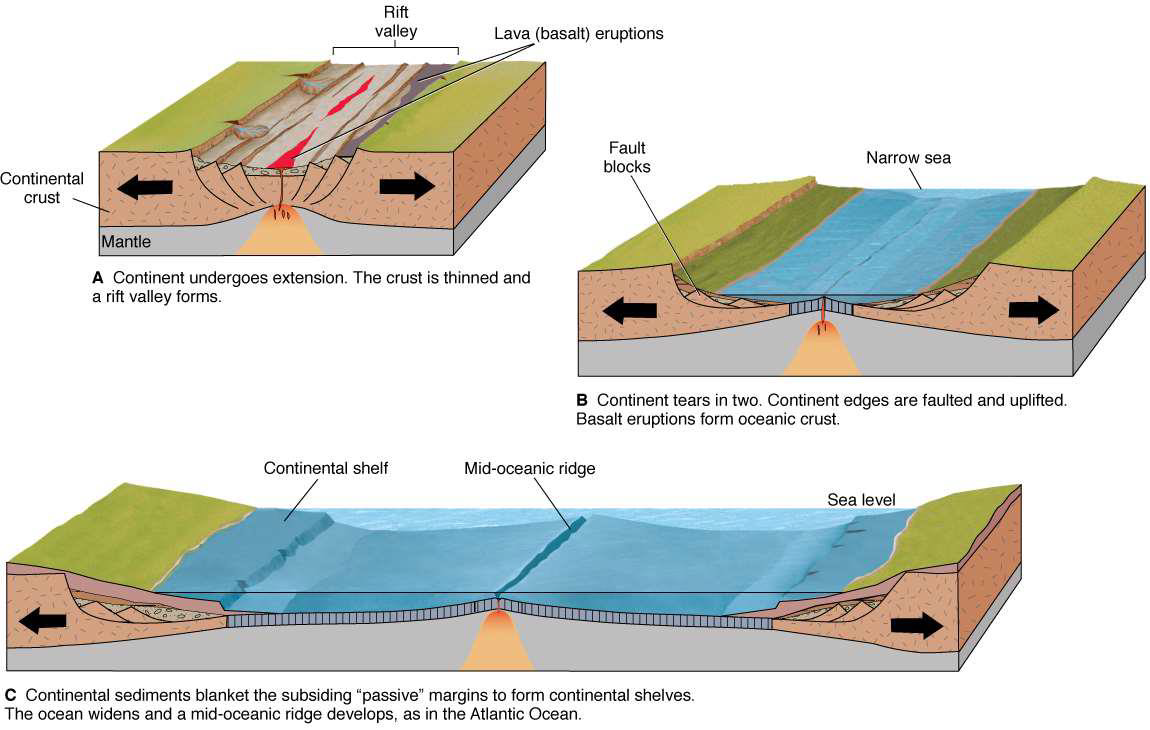
How does continental rifting relate to the creation of passive margins?
First 2 major stages of the Wilson Cycle
Rifting → continent extends, thinning the crust and allowing a valley to form
Continent then becomes two, separated by oceanic crust formed from basalt eruptions
The land that meets the water = passive margin
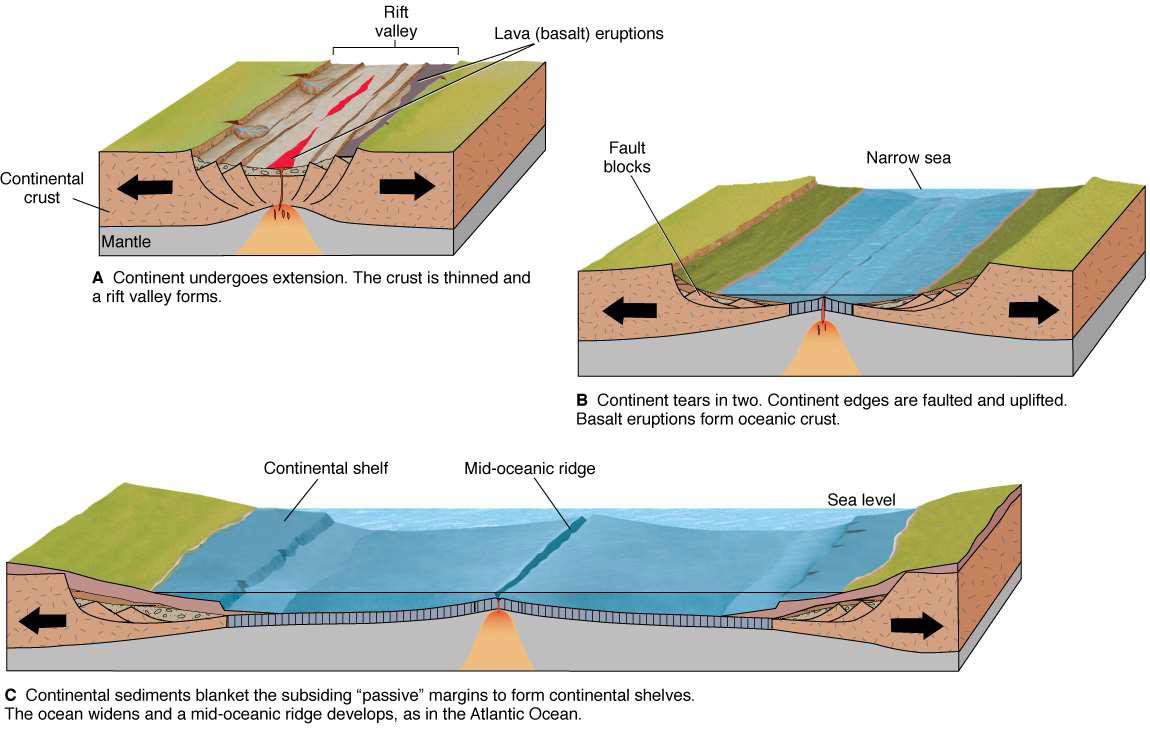
Differentiate between a rock and a mineral.
Rock = naturally formed, consolidated material
composed of grains of one or more minerals
Mineral = naturally occurring, inorganic, crystalline solid
Has a specific chemical composition
Building blocks of rocks
How do new oceans form?
Triple junctions
Passing over mantle plumes gradually weakens continental crust
Eventually, crust becomes so weak, a rift is created
With the expansion of the rift, water fills in an oceanic crust is created
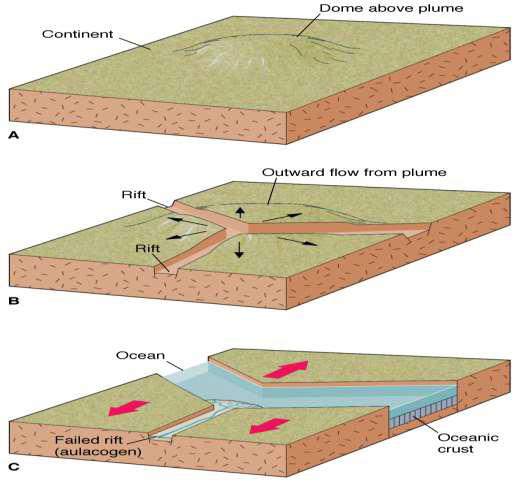
What is an embryonic ocean?
Early-stage ocean basin
Forms when a continental rift begins to separate a landmass
Allows water to accumulate in the widening gap
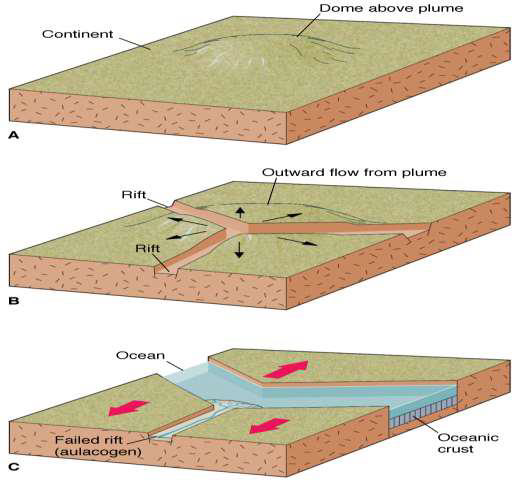
What is a triple junction?
a point on Earth where the boundaries of three tectonic plates meet
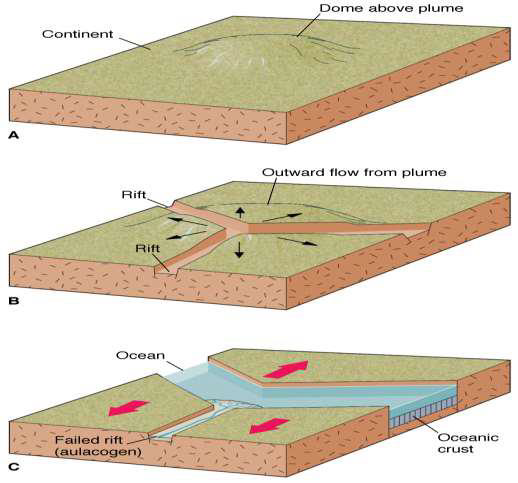
Discuss thermal doming above plume heads.
Passing over mantle plumes → doming/uplifting of the continental crust above
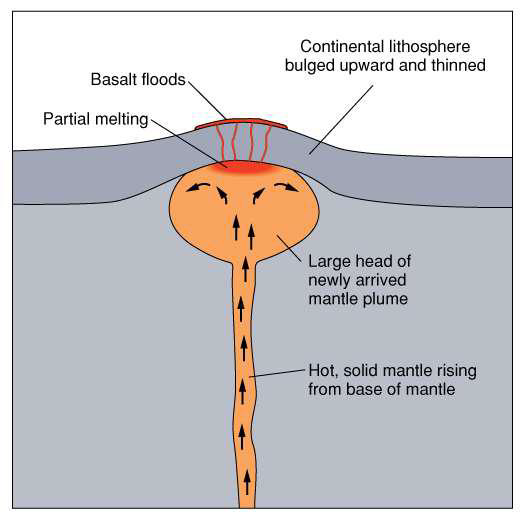
What are failed rifts (Aulocogens)?
a rift that begins to split a continent but does not fully develop into an ocean basin
What are flood basalts?
subset of LIPs, consisting of thick, widespread lava flows that cover large areas
what is a juvenile ocean?
an early-stage ocean basin that forms as a result of continental rifting and the initial separation of tectonic plates
represents the second stage in the Wilson Cycle
describe juvenile ocean shelves
Sediment from continent collects where land meets water
shallow, submerged edges of newly formed continental margins
Form on the transition from continental to oceanic crust
Sediments wash into basins where they are buried and lithified
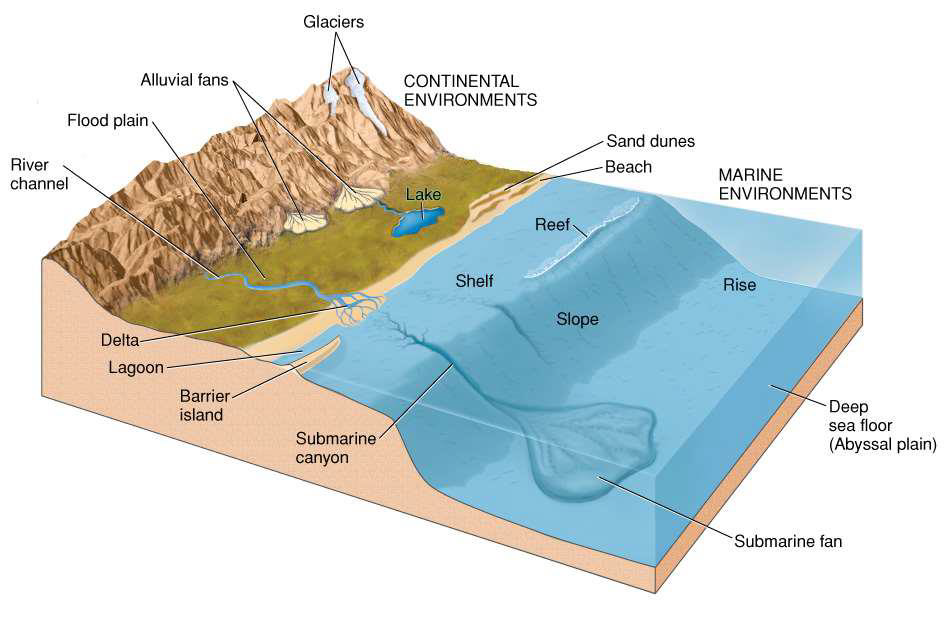
what are incipient oceaninc crust?
newly forming or embryonic oceanic crust that develops in an area where continental rifting is leading to the creation of a new ocean basin
What causes the uplift of the East African Rift?
Thermal doming
Where are most sediments today?
Continental shelves
i.e., passive continental margins
Describe the tectonic activity of continental shelves.
Tend to be stable
Shelves on active margins get destroyed consistently
Continental shelves are home to what?
A lot of biological activity
Most of the world's
Oil
Gas
Fisheries
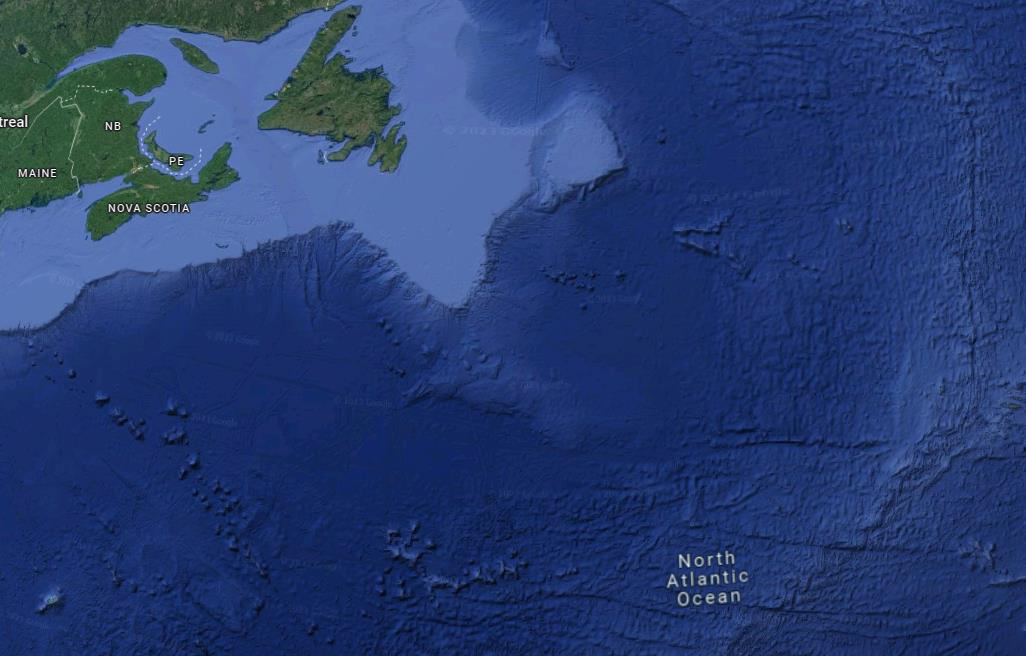
Why is there such a large cliff in the Grand Banks, Newfoundland?
High part = mostly continental crust
Low part = all ocean crust
Why is the Red Sea considered a juvenile ocean?
Has started to accumulate a shelf
There is creation of ocean crust at the centre
What plates form the triple junction at the East African Rift?
African
Arabian
Somalian
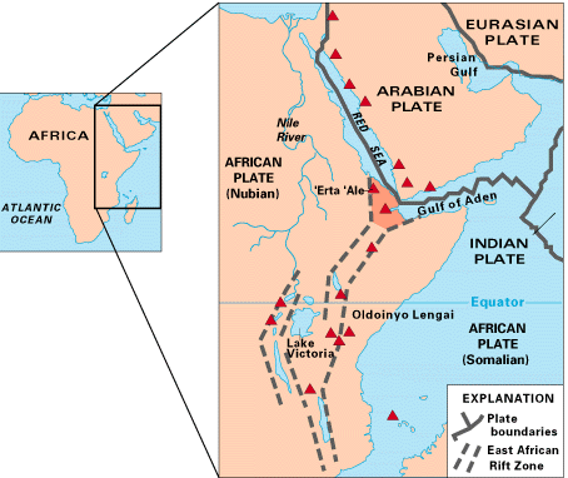
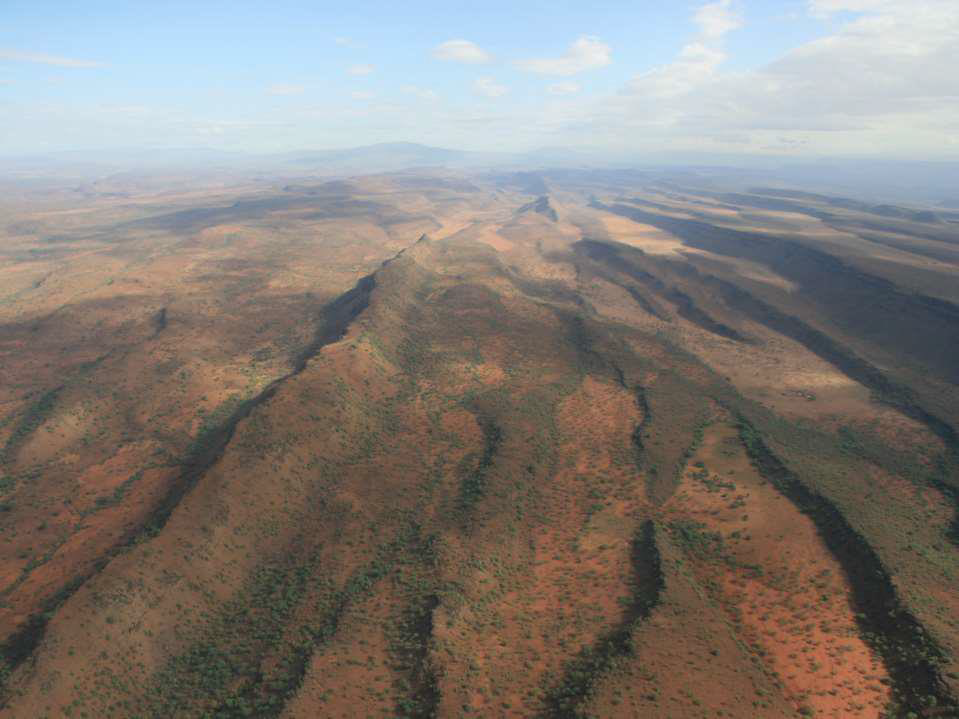
What are horsts and grabens?
H = highs
G = lows
Occur at a rift
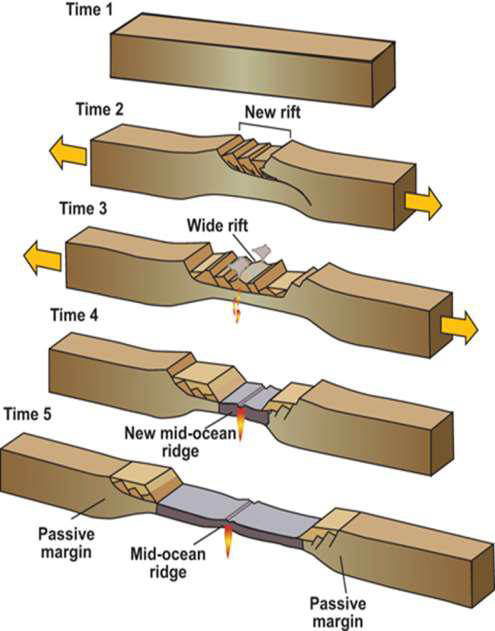
What are large igneous provinces (LIPs)?
New ocean crust (basalt) along the rift
Include flood basalts
Differentiate between Pahoehoe lava, Ropey lava, and AA lava

How does the Red Sea's opening influence surrounding plates? (Plate reconfiguration)
Pushes Arabian plate north into Europe
This is happening
Along the Dead Sea Fault Zone
Faster than the African Plate is moving NW
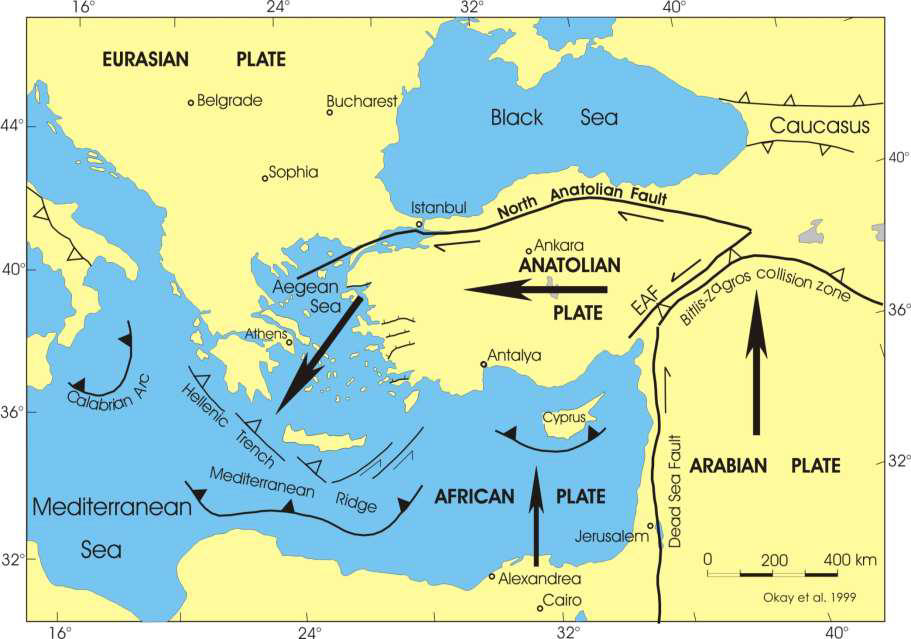
what is the Dead Sea Fault?
transform plate boundary between master moving Arabian and African plates
What is an endorheic basin?
closed drainage basin where water has no outlet to the ocean
e.g., Dead Sea
What are salt diapirs?
upward movements of salt within a layer of overlying rock
typically caused by buoyancy and pressure differences in the Earth’s crust
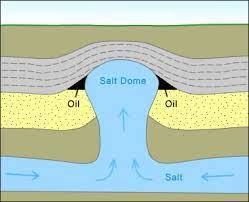
How do salt diapirs relate to the Atlantic Ocean's creation?
Salt accumulated in rifts during Pangea
They broke up, forming early Atlantic
What can we learn from EQs of antiquity?
How often did they happen?
i.e., fault's activity
Are there no EQs where there should be?
When might the next EQ be?
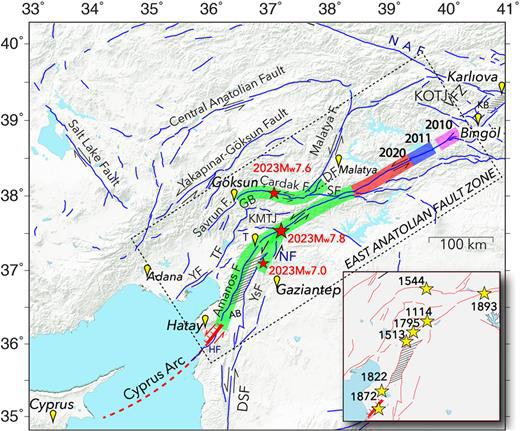
How does the Red Sea's opening influence Turkey?
T's moving westward along the North Anatolian Fault (NAT) and the East Anatolian Fault (EAF)
Why is NAT Fault one of the world's most dangerous faults?
Escape tectonics
i.e., a tectonic block or region is forced out or moved laterally due to the compressive forces exerted by surrounding tectonic plates
Cascading EQs propagate along here
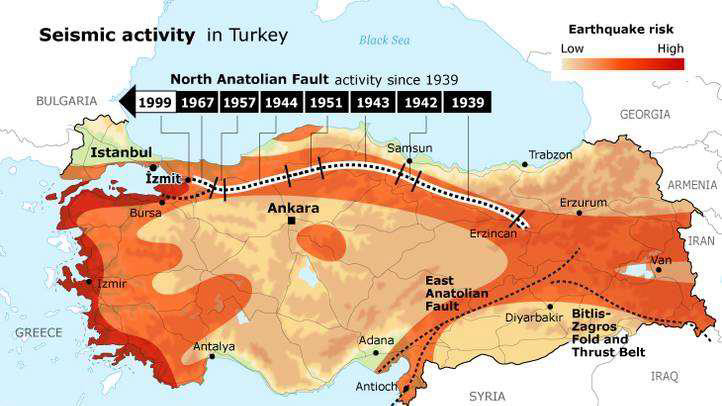
How does ocean floor change with age? What does this do in terms of the ocean floor's behaviour?
Older
Denser
higher mineral content
thicker lithosphere
More sediment
Farther from MOR
Eventually, floor will subduct due to density
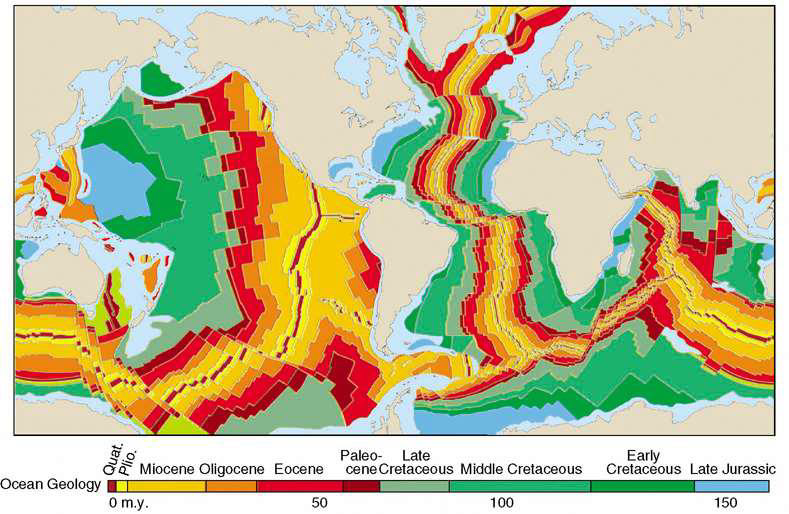
In this image, what does the width of each band represent?
The rate of spreading
e.g., during the Miocene, Atlantic spread slower than Pacific
Does the ocean spread at the same rate at all points across the global mid-ocean ridge system?
No
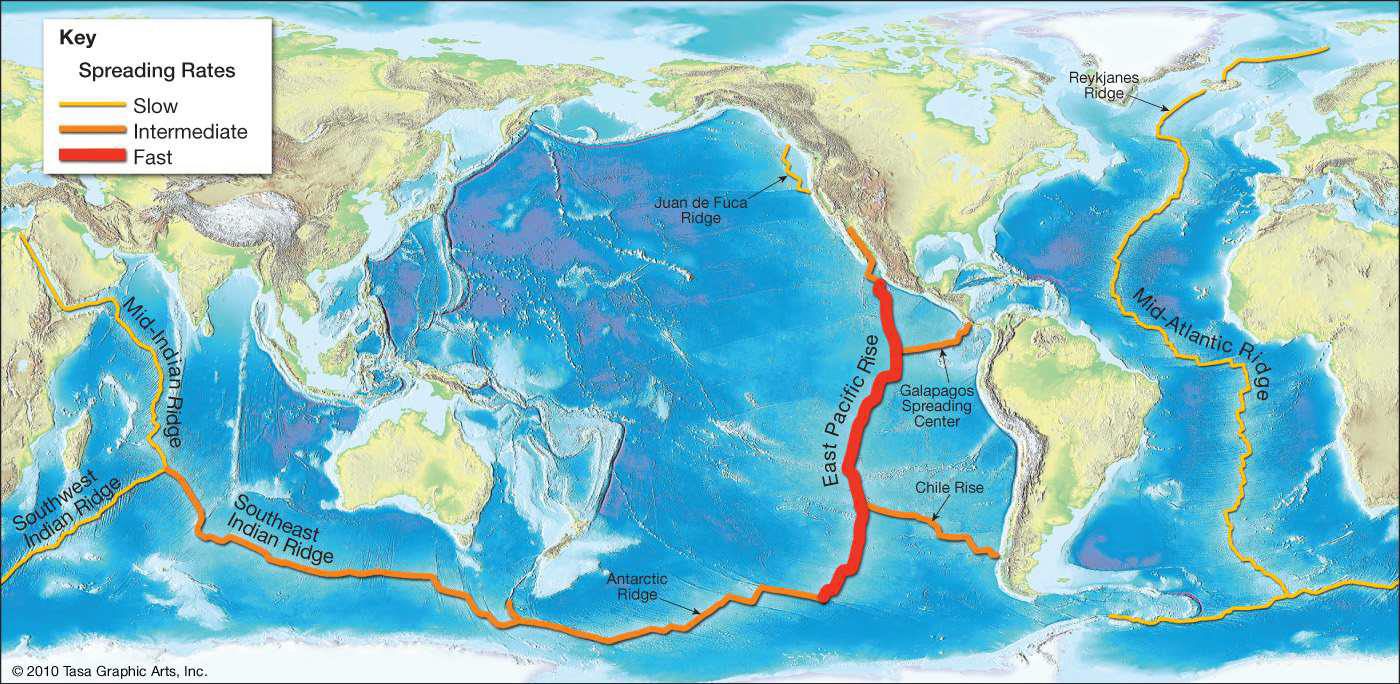
What is the total length of the global mid-ocean ridge system?
80 000km
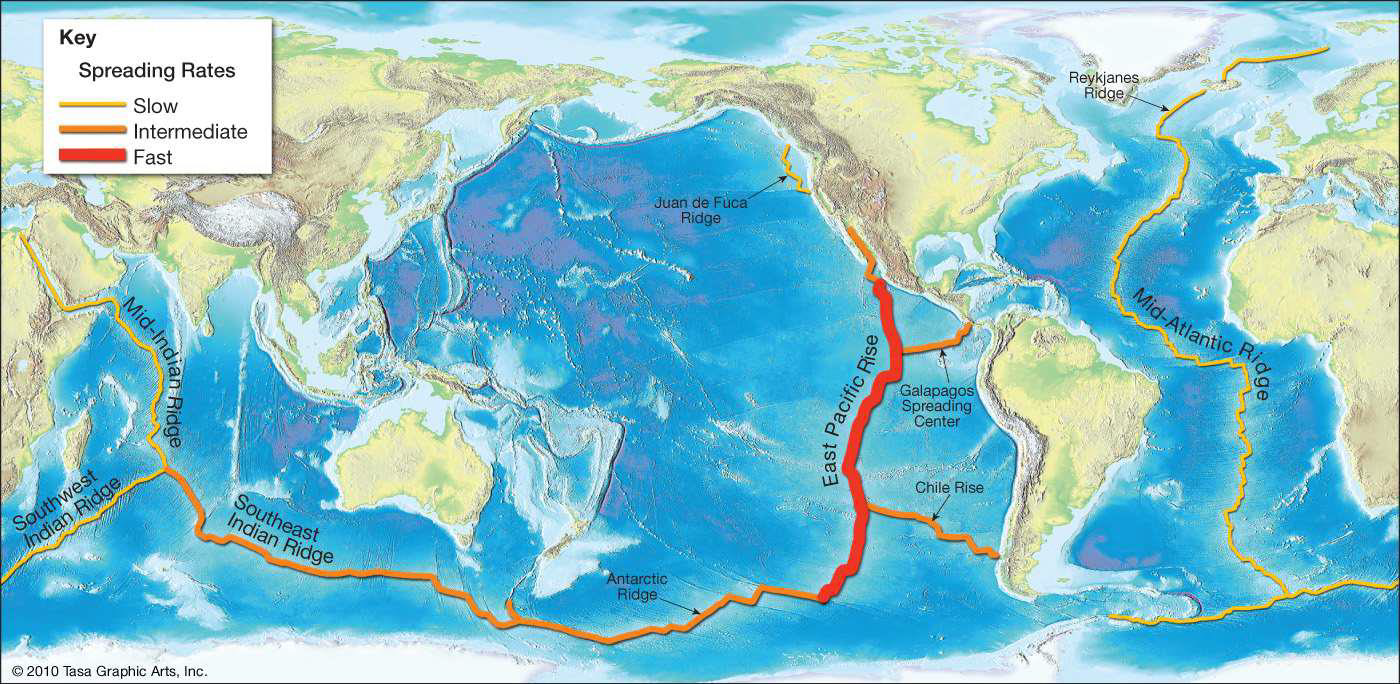
what are the two controls of seafloor spreading rate?
slab pull
ridge push
describe slab pull
(seafloor spreading)
subducting older oceanic lithosphere exerts greater tension to mid-ocean ridge relative to younger oceanic lithosphere
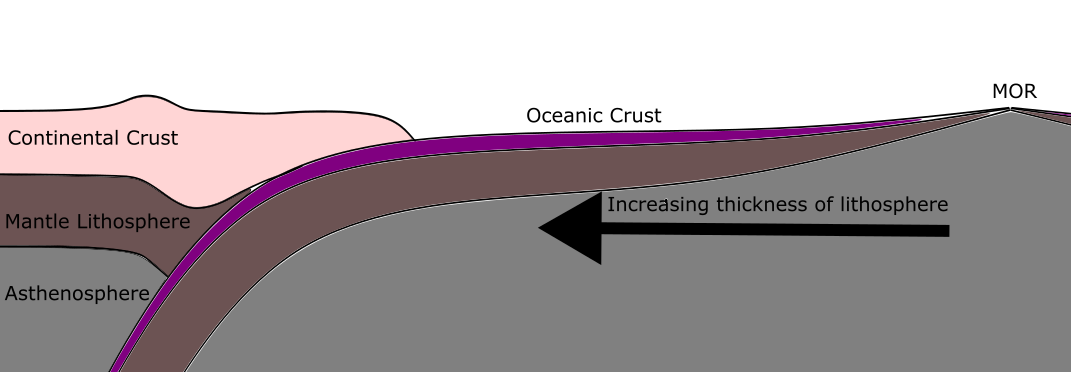
describe ridge push
thermal uplift of the midocean ridge causes gravitational sliding of the plates odd the ridge
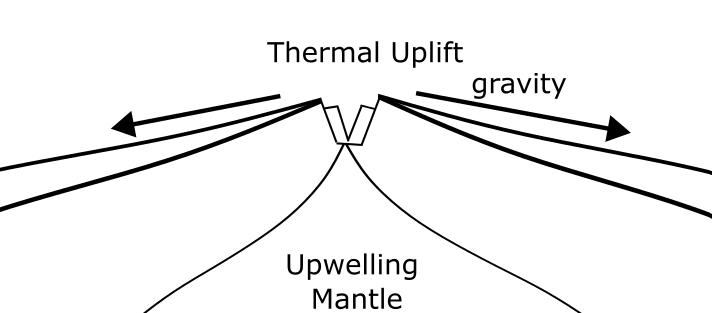
How does the rate of spreading influence ridge morphology?
Centre axial magma chamber is
Big when there's fast rate
Small when there's slow rate
Fast flows lead to
Broad, more diffuse volcanism
Broad shape
Pointy tops
Far lava spread

How can you study mid-ocean ridges and sea floor spreading?
Direct observation with submersibles (mostly autonomous vehicles now)
e.g., smokers, seafloor minerals
Studying ancient MORS
i.e., Ophiolites
Iceland
i.e., Mid-Atlantic Ridge is on land
What are smokers?
Active hydrothermal vents
Cold water filters through fractures and heats up, absorbing minerals
Deposits formed when hot mineral-filled water meets cold water
Water cools and minerals rain out
What do the voids in smokers allow?
Water to move up
What does the colour of the smoke from smokers/hydrothermal vents indicate?
Black = metal-filled, hot water
White = calcium carbonate filled, warm water
i.e., fluid isn't metal-rich
What are Ophiolites?
Accretion of obducted ocean crust
Remnants of ancient crust and mid-ocean ridges
Exposed to land because of ocean closure
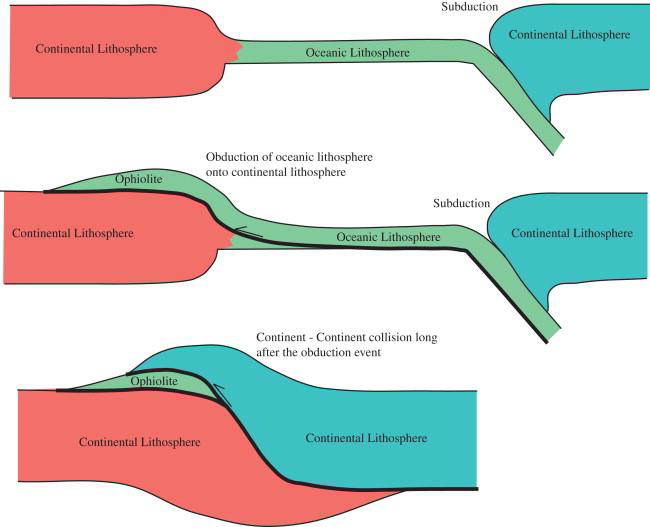
When does precipitation of minerals happen?
When mineral-rich water cools quickly
What is rock alteration?
When minerals move in or out of a rock
Depends on the chemical composition (e.g., pH) and temperature of the water
Where do Pillow Lavas form?
a.k.a., pillow basalts
From where lava erupts under water
What are sheeted dikes and where do they form?
Lava trails through a linear conduit
Form where basalts are repeatedly injected
Where do layered Gabbros form?
Where basaltic magma cools very slowly in an axial magma chamber
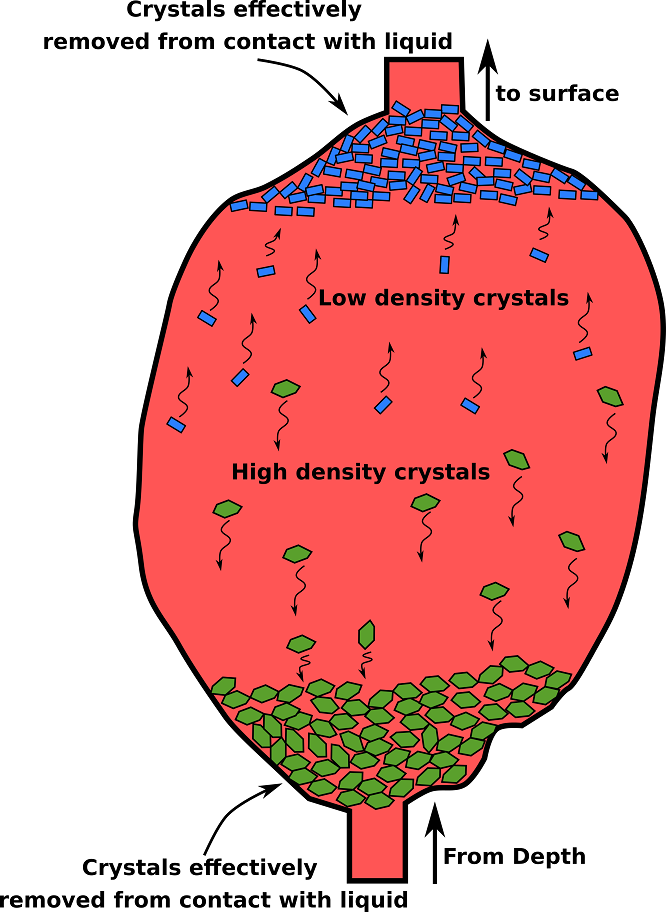
Describe the onion model of building oceanic crust at mid-ocean ridges
Pillow basalts erupt at surface
Intrusion of sheeted sikes at depth
Settling of gabbro from magma chambers
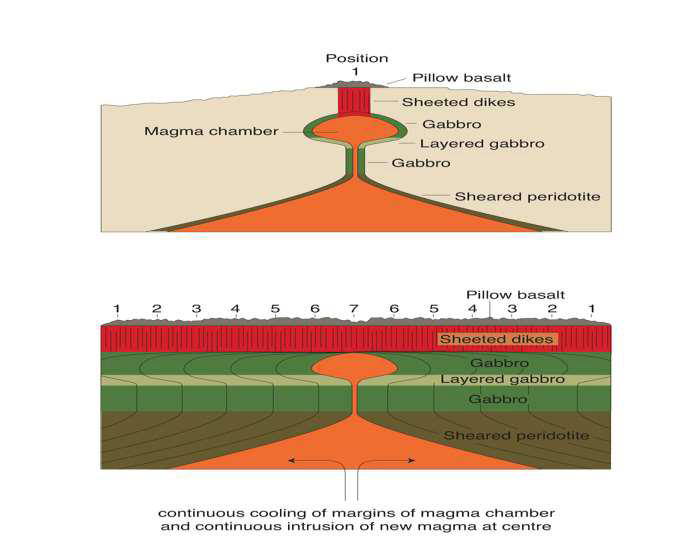
Why is the mid-Atlantic Ridge above sea level in Iceland?
The Iceland Plume has lifted it
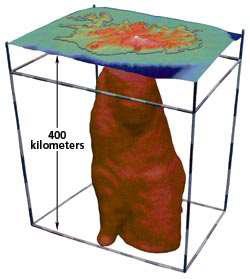
How does the Afar Triangle relate to the Mid-Atlantic Ridge in Iceland?
Similar creation
Mantle plume under continental crust caused release of flood basalts to form LIP
How does the Icelandic Plume relate to the separation of the British Isles and Greenland?
It's responsible for the separation and releasing flood basalts
40 MA
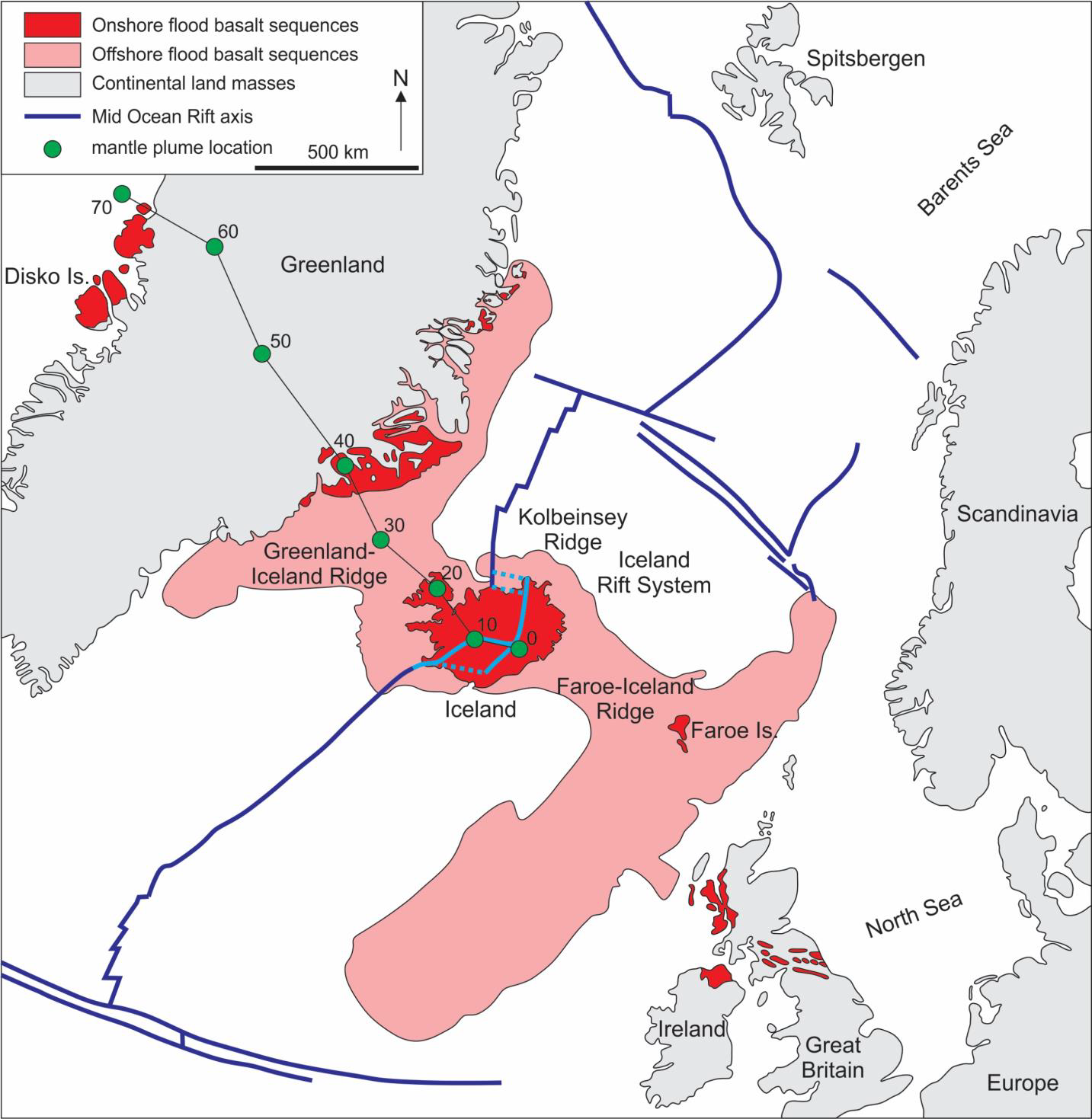
How is the mid-Atlantic Ridge moving relative to the Iceland Plume?
Northwest away from the plume
i.e., moving off the plume
Differentiate between relative and absolute motion
Relative = rate of motion of one plate relative to another
Absolute = entire plate movement
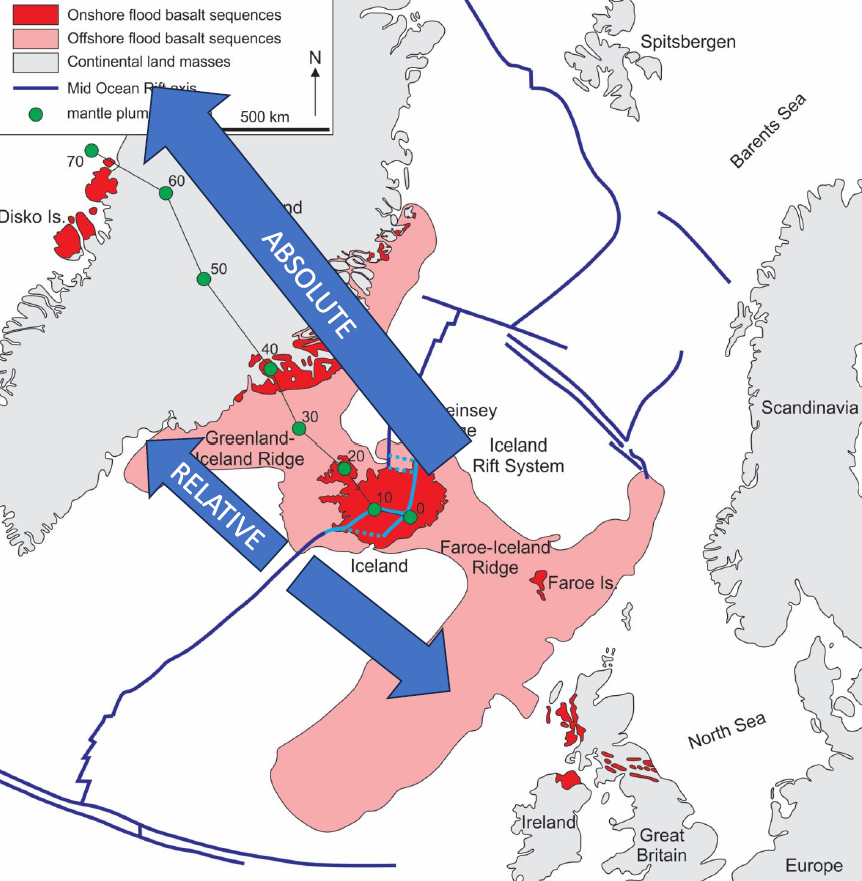
What is ridge jumping?
Ridge is moving away from plume
Describe fissures.
Cracks in the crust
Can go down several kilometres
What happens when magma exits a fissure?
Fissure eruption + magma flow
Usually low viscosity, not too dangerous
What are protective berms?
Same material as lava used to redirect lava flow
Must predict where the fissure + flow will occur
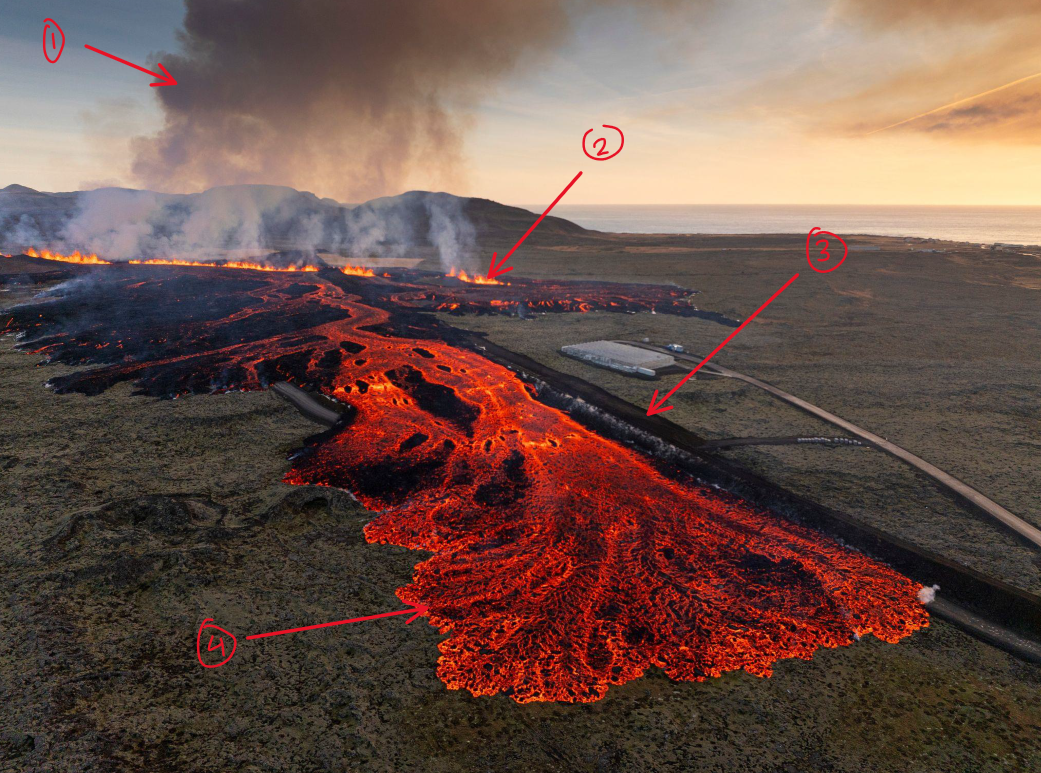
Describe the elements seen in this picture
ash
fountain magma
protective berm
lava flow
Can effusive eruptions have a global impact? Give an example.
Yes
e.g., Lakigigar large fissure eruption (1783)
15 cubed km of magma and hydrofluoric acid + sulfur dioxide
Led to
Death of 50% Iceland's livestock
Famine
Destroyed 21 villages
Aerosols that influenced Europe and led to crop failure and, consequently, the French Revolution
Describe columnar basalt
Pooled magma that cools from top and bottom
Forms columns
How do successive lava flows impact oceanic crust?
Thicken crust
Describe the Eyjafjallajokull volcano.
Sits underneath a small ice cap
More dangerous due to lava and water interactions
Describe phreatomagmatic eruptions
Eruptions involving steam and magma
They become explosive and can lead to floods
How many times has Katla erupted over the past 1100 year and how far of an impact has it had?
20 times
Ash as far as Scotland
How do phreatomagmatic eruptions influence the volcanic ash released?
Magma melts ice
Ice interacts with magma
"shattered rock" explodes out of the volcano
What is tephra?
Anything thrown out of a volcano
e.g., ash, bombs
What is Fjallsjokull?
An outlet glacier of the Vatnajokull Ice Cap
How are flat-topped ("Moberg") mountains formed?
Volcanic eruptions under ice caps
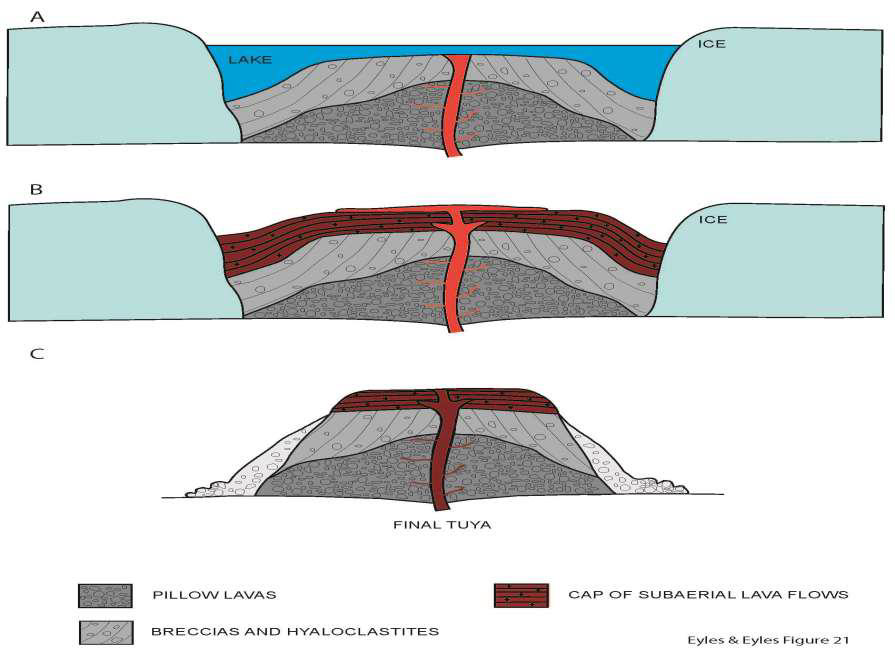
What causes Hyaloclastite breccia formation?
"glassy fragments" formed by fast cooling
Does ocean floor temperature change depending on distance from MOR?
Yes
Colder = farther
Why is the ocean floor draped in sediment?
Once off the MOR, it sediment starts to settle over it
Due to
Primary productivity
i.e., biological activity in ocean (e.g., photosynthesis from phytoplankton)
Terrigenous sediment
Sediment moves from continents into ocean
Other than sediment, what is on the ocean floor?
Ocean islands
Guyots
Seamounts
Atolls